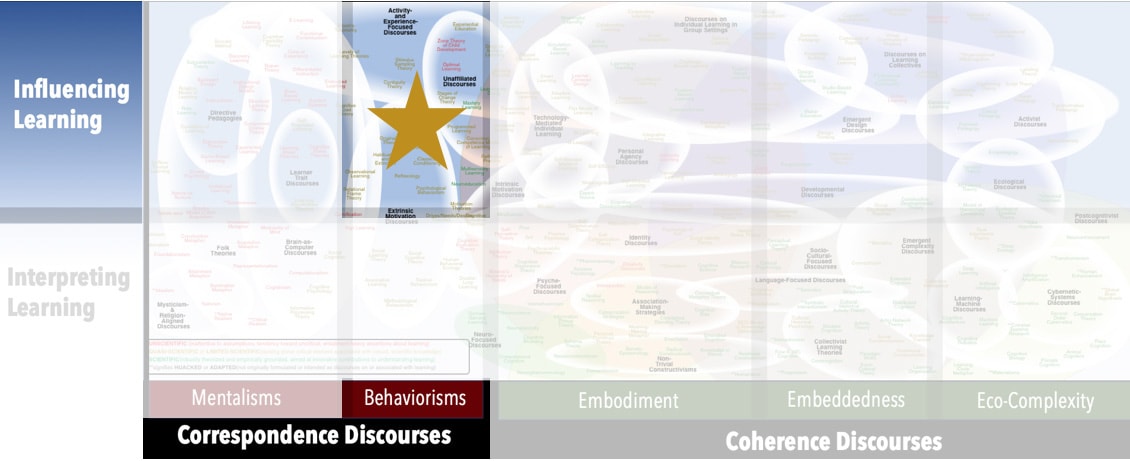Focus
Producing observable and sustainable changes in social behaviorPrincipal Metaphors
- Knowledge is … repertoire of behaviors
- Knowing is … behaving (triggered by stimuli)
- Learner is … a person
- Learning is … changes in social behavior
- Teaching is … training; engineering behavior (through deliberate conditioning)
Originated
1960sSynopsis
Applied Behavior Analysis is included among Behaviorisms. It is concerned with developing and applying evidence-based techniques to change behaviors – especially social behaviors. Applied Behavior Analysis is closely associated with Behavior Modification, but it places a stronger emphasis on fine-grained analyses of both aberrant and acceptable behaviors before any interventions, as well as rigorous observation and measurement during interventions. Associated discourses include:- Behavior Analysis (various, 2000s) – Defined in different ways by different people, Behavior Analysis is sometimes used interchangeably with Applied Behavior Analysis, sometimes defined as the empirical study of animal behavior, and most often described as a general domain that comprises three branches: Applied Behavior Analysis, Experimental Analysis of Behavior, and Behaviorisms. All three characterizations are flawed, the first because it’s too narrow; the others because too much territory is claimed. (It is much easier to argue that Behavior Analysis is a subdiscourse of Behaviorisms than the other way around.) Associated discourses include:
- Behavior Analysis of Child Development (Behavioral Development) (Sidney Bijou, Donald Bear, 1960s) – a version of Applied Behavior Analysis that is structured around three stages – basic, foundational, and societal. These stages are seen as both socially determined and dependent on genetics, experience, and situation.
- Behavior Analysis Theory (Behavior Analytic Theory) – the study of behavior for the purpose of influencing it. Oriented by the assumptions of Behaviorisms and employing empirical methods, Behavior Analysis Theory regards one’s actions as selected by one’s environment and so focuses on reformatting environment–behavior relations.
- Experimental Analysis of Behavior (various, 2000s) – Explicitly based on Radical Behaviorism, Experimental Analysis of Behavior is concerned with establishing strategies to affect behaviors that are based on data-driven studies of the relationships between stimuli and responses.
- Positive Behavior Support – a blend of Applied Behavior Analysis and Behavior Modification, aimed at affecting one’s difficult behaviors by altering one’s environment (including the actions of persons in that environment). Associated notions include:
- Functional Behavior Assessment – a preparatory step before devising a Positive Behavior Support plan, focused on identifying the contexts and conditions associated with difficult behaviors
- Professional Practice of Behavior Analysis – a hybrid domain, drawing principally from education and Behaviorisms, concerned with the delivery of interventions in a broad range of settings
Commentary
As with Behavior Modification, Applied Behavior Analysis has been criticized for its focus on decreasing a specific behavior, rather than supporting the learner to cope in complex social and cultural worlds. Consequently, Applied Behavior Analysis has been associated with such psychological issues as learned helplessness and diminished self-esteem. Some practitioners and practices have also been criticised for efforts to eliminate autistic behaviors, “cure” homosexuals, and other efforts to enforce assumed forms of “normality.”Authors and/or Prominent Influences
Teodoro Ayllon; Jack Michael; Donald M. Baer; Montrose M. Wolf;Todd R. RisleyStatus as a Theory of Learning
Applied Behavior Analysis is not concerned with understanding the complex dynamics of human learning.Status as a Theory of Teaching
Applied Behavior Analysis involves the application of a theory of learning (i.e., Methodological Behaviorism). It does not seek to offer any insight into the nature or processes of human learning, focusing rather on protocols for suppressing target behavior.Status as a Scientific Theory
Proponents of Applied Behavior Analysis make strong claims about being rigorous scientific, and the discourse meets most of our criteria for scientific inquiry. However, it falls short on matters of critical attentiveness to its central constructs.Subdiscourses:
- Behavior Analysis
- Behavior Analysis of Child Development (Behavioral Development)
- Behavior Analysis Theory (Behavior Analytic Theory)
- Experimental Analysis of Behavior
- Functional Behavior Assessment
- Positive Behavior Support
- Professional Practice of Behavior Analysis
Map Location

Please cite this article as:
Davis, B., & Francis, K. (2023). “Applied Behavior Analysis” in Discourses on Learning in Education. https://learningdiscourses.com.
⇦ Back to Map
⇦ Back to List
